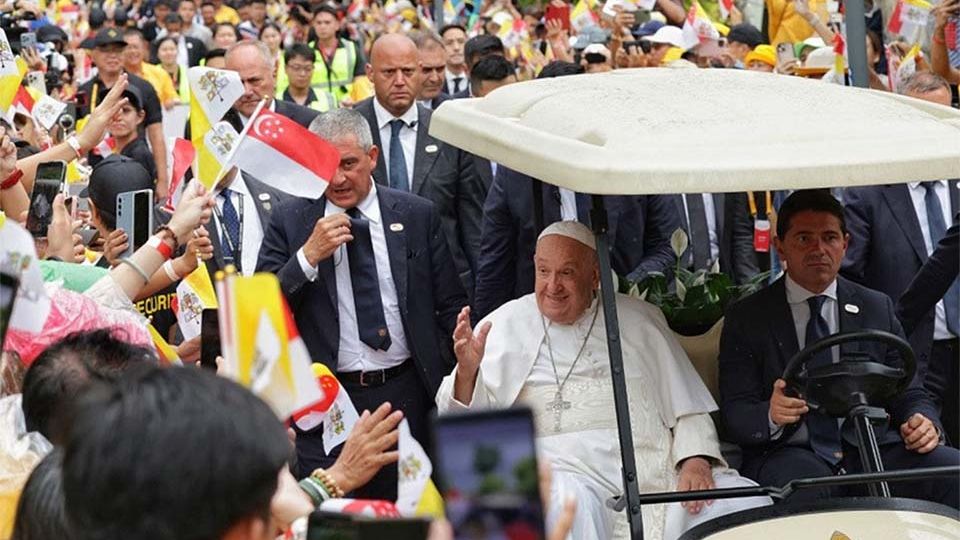September 16, 2024
JAKARTA – Indonesia must be delighted that during his three-day visit last week, Pope Francis lauded the interfaith harmony it has endeavored to preserve since independence, as evident in Jakarta Cathedral and Istiqlal Mosque’s decades-long coexistence, not to mention Terowongan Silaturahmi (Tunnel of Kinship), built in 2020-2021 to allow easier access between the two houses of worship.
During his visit last Thursday to Istiqlal Mosque, the largest in Southeast Asia, the pontiff congratulated Indonesia for having “a space for dialogue and creating the sense of mutual respect among different faiths”, referring to the six officially recognized religions of Buddhism, Catholicism, Confucianism, Hinduism, Islam and Protestantism.
The country is also home to minority faiths, such as West Java’s Sunda Wiwitan and North Sumatra’s Parmalim, as well as Bahaism from Iran and Judaism from ancient Canaan.
But this begs the question: Is mutual respect truly practiced in today’s Indonesia, which is predominantly Muslim?
As much as we hope that interfaith harmony is genuinely observed in all corners of our nation, we must never turn a blind eye to the religious extremism, intolerance and discrimination of the past: a mandatory hijab policy, dissolution of religious events, demolition of houses of worship, the 2002 Bali bombings and the 2018 Surabaya church bombings.
In addition, religion has been frequently politicized, especially in an election year, further fanning division across our diverse country.
As the head of state of Vatican City and the leader of 1.3 billion Catholics globally, Pope Francis must have been well aware of such inconvenient truths, but he chose to highlight Indonesia’s interreligious coexistence instead.
It is highly likely that this decision did not come from a vacuum and that the 87-year-old pontiff knows of Indonesia’s potential in leading global peacebuilding efforts. After all, the country’s two largest Muslims organizations, Nahdlatul Ulama and Muhammadiyah, have been striving to promote wasathiyah (religious moderation) and Islam as rahmatan lil alamin (universal blessing).
We should therefore strive to prove his point.
The problem with religious intolerance or extremism in Indonesia is that they are often sparked or justified by draconian government regulations, whether at the national or regional level.
For example, take the 2019 decision of Yogyakarta’s Bantul regency administration to revoke the operating permit of Immanuel Sedayu Indonesian Pentecostal Church after the residents of Sedayu district protested.
This came three years after Bantul Regental Decree No. 98/2016 to implement a joint ministerial decree issued by the Religious Affairs Ministry and Home Ministry, which mandates construction projects for houses of worship to obtain the approval of at least 60 local residents and 90 congregants, among other requirements.
The congregation of Immanuel Sedayu, which was built in 2003, had coexisted harmoniously with the followers of other religions in the district, exercising their constitutionally guaranteed “freedom to embrace their respective religions and worship in accordance with the respective religions”.
But the state brought an end to this environment of peace and tolerance that had existed tfor years by issuing problematic regulations that also violated the Constitution.
The Setara Institute for Democracy and Peace notes in its latest annual report that “intrusions into houses of worship” still dominate violations of religious freedom in Indonesia. More worryingly, its data show that the number of such incidents have increased over the past four years, from 24 cases in 2020 to 44 in 2021, and then to 50 in 2022 and 65 in 2023.
Nevertheless, it is not too late for the state to make amends through measures that aim to significantly reduce incidents of religious intolerance, and eventually prove the pope right in his perception of Indonesia’s interfaith harmony.
For starters, it can repeal the problematic joint decree on houses of worship.


